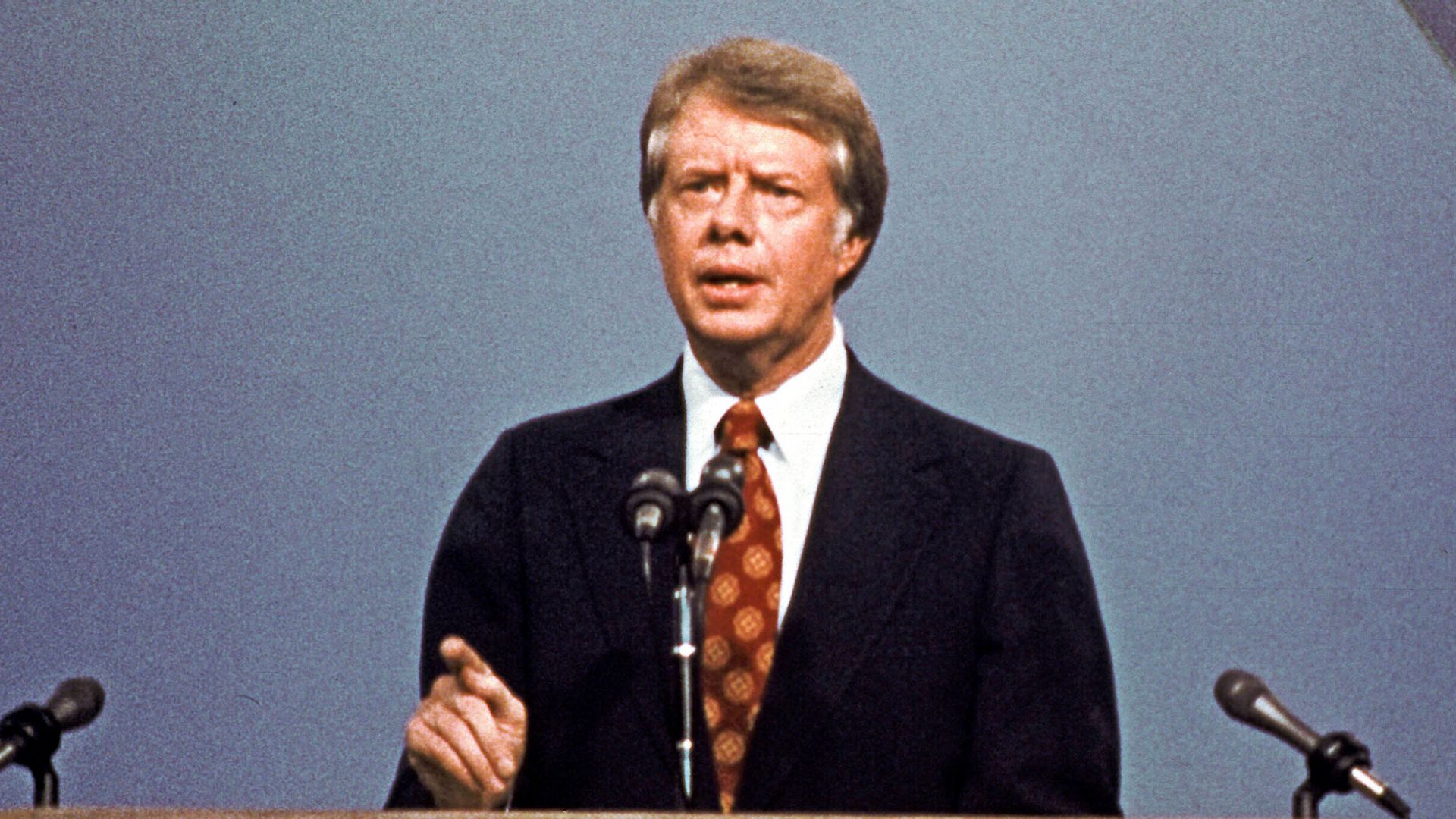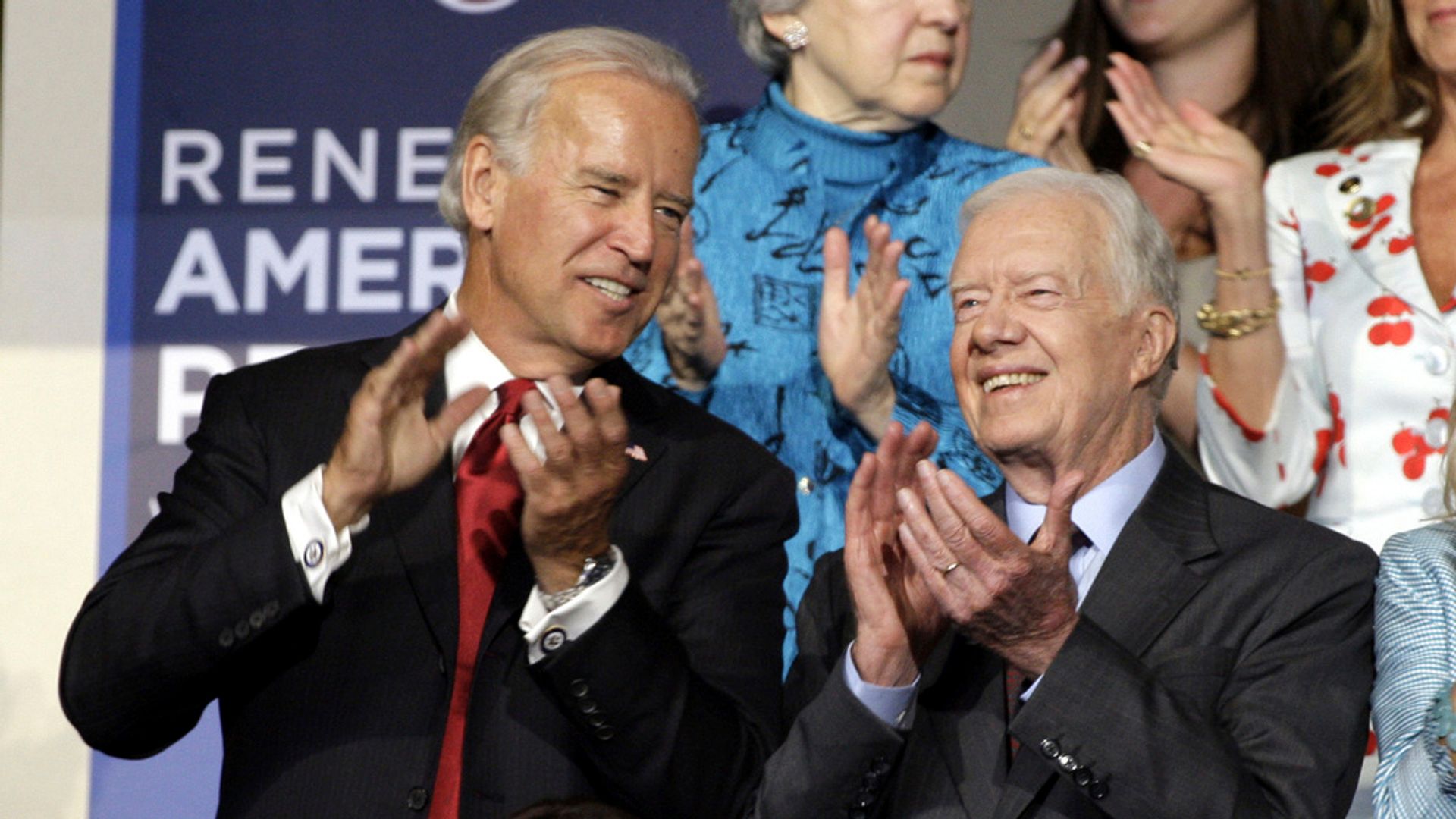In the late 1970s, America was not in a good place; reeling from a war and from Watergate.
Then came a man called Jimmy.
“Jimmy who?” the nation asked.
And so it was that the nation was somewhat dismissive when a peanut farmer called Jimmy Carter announced a run for the White House.
Beyond his home state of Georgia, where he had served as governor, James Earl Carter Jr was not well known.
But it would turn out, Jimmy Carter was just what 1970s America needed.
After the political turmoil of Nixon and Watergate and the quagmire of the Vietnam War, America craved stability, calm and integrity.
Former US president Jimmy Carter dies
US attorney general tried to block Gerry Adams fundraising in 1995 over IRA weapons fears, unearthed records reveal
Joe Biden reduces all but three US federal death sentences to life imprisonment
The 39th president of the United States did not provide the drama of those who came before him or those who would follow him.
Yet over a remarkably long life, punctuated by a short presidency, Jimmy Carter built a considerable legacy deserving of considerable reflection.
Carter the healer
“Compassionate”, “honourable”, a “peacemaker”, a “healer”.
They are words so often used to describe the American leader who lived a life longer than any other.
Late 1970s America was a nation reeling from the Watergate scandal and the disgraced presidency of Richard Nixon followed by the accidental presidency of Gerald Ford.
Read more:
Former US president Jimmy Carter dies
‘An extraordinary leader’: Tributes to Jimmy Carter
The wider backdrop was a long war in Vietnam, ending in a humiliating defeat and a fresh blot in a proud nation’s history.
Enter Jimmy Carter, 52-years-old; five feet seven inches – unassuming and unimposing both physically and in character.
Peanut farmer, turned submariner, turned politician; he was a man of the people whose core instinct was that a government is only as good as its people.
His healing qualities, clearly threaded through his life, were displayed on day one of his presidency.
In a bold move he granted unconditional pardons to hundreds of thousands of men who evaded the Vietnam War draft.
He had said the pardon was needed “to heal our country after the Vietnam War”.
Of the bitter divisions sparked by the war, he said: “We can now agree to respect those differences and to forget them.”
He pioneered a bold vision for compassionate centre-left politics which would, many years later, be emulated by presidents Clinton, Obama and Biden.
Yet Jimmy Carter would survive only one term as president.
In those four years he faced huge challenges – an energy crisis, Soviet aggression and Iran – themes which, it turns out, endure.
A childhood which shaped a presidency
Jimmy Carter was born where he died, in the town of Plains, Georgia on 1 October 1924.
His childhood unquestionably moulded the person and politician he would become.
1930s Georgia was a place of segregation. Two Americas existed side by side, separated by racism.
But Carter’s mother, a nurse, boldly ignored the state’s segregation laws, and so young Jimmy’s upbringing was one of coexistence in a place where there was none.
Decades later Carter would tell American talk show host Oprah Winfrey how every one of his childhood friends was black.
It was an experience which moulded his mind and would allow him to help change history decades later.
Young Jimmy Carter joined the Navy, serving as a submariner – a role that surely takes a particular type of character.
His father’s death in 1953 brought him back to Georgia where he ran the family peanut farm.
But politics beckoned. It was race and racism which lured Carter to activism with the Democratic Party.
By the 1960s it would propel him to the state senate and, by 1970, to the top job in Georgia – governor.
The long-shot president
He was the dark horse for president; a long-shot candidate who made it all the way.
His childhood experiences of coexistence over division were threaded through his term in office and led to significant yet oft-forgotten achievements.
President Carter recognised and valued the power of American leadership in the protection of human rights.
Global achievements
It was his blunt message to the white rulers in South Africa which helped to precipitate the end of Apartheid and a peaceful coexistence many years later.
His influence in the Middle East was profound, but controversial too.
The Camp David accords represented Carter’s greatest foreign policy achievement. He brought together Israel and its greatest enemy of the time, Egypt.
The image of Carter cupping the clasped hands of Egyptian president Sadat and Israeli Prime Minister Begin on the north lawn of the White House in September 1978 is iconic. It represented the framework on which coexistence in the Middle East continues to be built.
With the deal he did more for Israeli security than any American president since, and yet he maintained a compassion for the Palestinian cause that no other American president has come close to.
Years later, out of office, he was among the first to accuse Israel of its own apartheid regime against the Palestinians.
A presidency dominated by “events”
Under his presidency, the Cold War got hotter. A wary Carter ditched a key arms reduction treaty with the Soviet Union. It would raise tensions but eventually help precipitate the collapse of the USSR.
With Britain, he fostered the so-called “special relationship”; he and British prime minister James Callaghan were close.
But “events” overtook his vision and his presidency unravelled.
In Iran, revolution came and US hostages were taken. American diplomats were held hostage for more than a year. A risky rescue ordered by president Carter went wrong, eight US servicemen were killed and Carter was blamed.
After just one term, Carter was out. The American people, struggling economically, chose the Republican showman Ronald Reagan and an optimism they could no longer find in Carter.
Misjudged by history?
History is so often cruel and distorted. It would hand many achievements built by Carter to Reagan instead.
It was Carter who laid the foundations for Middle East coexistence, and though he would be let down by partners later, and coexistence seems at times to be very far off, his vision remains at the core of the solution. He has arguably done more to fix the Middle East conundrum than any other American president since.
Be the first to get Breaking News
Install the Sky News app for free
On the Cold War, it was Carter’s decision to ditch the detente with the Soviet Union which would eventually seal its demise. Reagan would not have been able to demand Gorbachev “tear down this wall” without Carter’s leadership in the years before.
The Democrat presidents since have often borrowed Carter’s core principles and yet the party orphaned him.
In November, as the nation chose between Kamala Harris and Donald Trump, his spokespeople confirmed that he had cast his vote.
It was not revealed who he had voted for but was widely assumed that his final democratic act was to vote for Kamala Harris.
His son Chip said his father had not voted Republican in his life.
A legacy beyond politics
This “involuntary retirement”, as Carter would later put it, left much undone and it was really only after leaving office that he began to build the legacy he’d want to be remembered for.
With his wife, Rosalynn, he founded The Carter Center, a charity with his principle of healing at its heart.
Follow our channel and never miss an update
The charity’s work – conflict resolution, disease prevention and the promotion of democracy – continues to this day. It represents president Carter’s legacy in 80 nations around the world.
In 2002, it was this work which earned him the Nobel Peace Prize.
Since then, under his leadership, its work has helped to nearly eradicate Guinea Worm Disease. As of 2021 there were just 15 cases reported globally. An extraordinary achievement.
At home in America, the charity Habitat for Humanity was a central part of the Carters’ fundraising efforts. Over many years, Jimmy and his wife were seen building and renovating homes for some of the nation’s poorest.
And away from this spotlight at his lifelong home in Plains, Georgia, president Carter was a painter, a furniture maker, a winemaker, and an author of a remarkable 32 books.
The death of his wife Rosalynn last year must have been an enormous blow for Carter.
She had been at his side always, and so often hand in hand. His best friend, his counsel, his “chief advisor”, his wife since 1946.
So often over the years, he’s been asked to reveal the magic of their bond. His answer: “Never go to bed angry.”
“Always make peace,” he said.
In much more than just marriage, that was president Carter’s defining principle.
He’s survived by his four children Jack, James (Chip), Donnel (Jeff) and Amy, 11 grandchildren and 14 great grandchildren.






